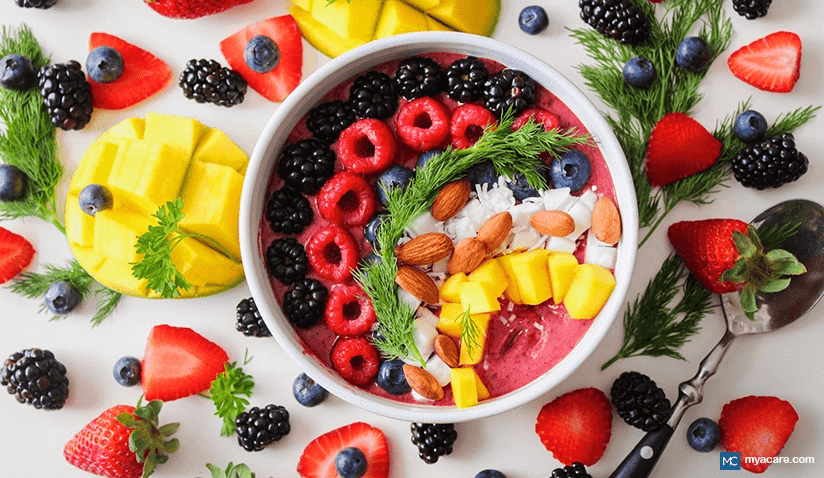10 Foods That Can Boost Oral Health

The relationship between oral health and general wellbeing is getting more attention with increasing evidence. Individuals are taking more care of their oral hygiene and are increasingly aware of oral diseases (e.g., dental caries, periodontitis, and oral cancers). Besides maintaining oral hygiene at home and visiting the dentist regularly, individuals can prevent oral diseases by making healthier food choices. In this article, we discuss foods that boost oral health and reduce the incidence of oral diseases.
1. Leafy vegetables, carrots, and tomatoes: These are an essential part of a balanced diet and are good for teeth. They are high in water and fiber content. A high fiber diet requires more chewing which activates the salivary flow and facilitates the removal of food debris from teeth surfaces. It also introduces antibacterial agents in the oral cavity which instill a protective effect on teeth and supporting structures. Plant-based diets are rich in protective factors such as organic phosphates which adsorb on the surface of teeth (enamel) and form a protective coating. Fiber-rich vegetables also aid in the mechanical removal of plaque at an early stage before it hardens and damages the gums. Tomatoes are a rich source of lycopene which is an effective antioxidant. It neutralizes free radicals which can damage the human cell DNA, reducing the risk of oral cancer.
2. Apples: Apples are a rich source of fiber, which stimulates saliva production. The retention of food particles and subsequent bacterial activity cause tooth decay and gum diseases. Increased saliva flow aids in cleansing food particles and bacteria from the surfaces of teeth. Apples also contain polyphenols that inhibit the activity of cariogenic (decay-causing) bacteria, reducing the risk of caries.
3. Grapes and raisins: Regular consumption of grapes improves the vitamin C levels in the body. Vitamin C rich diets aid in healing of diseased periodontal tissues (tissues supporting teeth in the mouth) due to their antioxidant property. Grape seed extract is also high in proanthocyanidins that aid in the remineralization process of artificial root caries lesions.
Raisins are dried grapes that are rich in polyphenols, flavonoids, iron, minerals, potassium, calcium, and vitamin B. These constituents are known to benefit the overall health of individuals. Raisins are good sources of fiber and have antioxidant properties. They also have an antimicrobial property and are capable of suppressing the adverse impact of microorganisms, which may cause oral diseases.
4. Tea: Consumption of tea, especially black and green teas, is considered beneficial for oral health. Polyphenols present in tea inhibit the growth and activity of microorganisms that decay teeth and cause inflammation of gums. Research suggests that regular consumption of tea is associated with decreased prevalence of decayed teeth. In another research, the regular rinsing or gargling for 1 minute with tea extracts inhibited the bacterial count for 5-60 minutes and promoted oral health. Teas are also a great source of fluoride that accelerates the process of remineralization of dental hard tissues. The presence of a chemical (catechin) in tea displays an antimicrobial effect against microorganisms causing periodontal diseases. Some researchers have also suggested a potential role of tea in decreasing the risk of oral cancers.
5. Dairy: Intake of milk and other dairy products such as cheese and yogurt are known to boost oral health. Dairy products contain protective factors such as protein (casein), calcium, and phosphate that strengthen teeth and prevent the demineralization of teeth surfaces. The milk proteins adsorb on the tooth surface and form a protective coating against tooth decay. These dairy products are also used as a delivery vehicle for the administration of probiotics to promote good health. These probiotics are non-virulent live microorganisms which, when given in adequate quantities, favor health benefits. Research suggests that administration of probiotics through dairy products results in decline in the disease-causing microbes or modification in their metabolic activity. This leads to reduction in the symptoms of oral diseases such as periodontal disease, decay, fungal infection (candidiasis), and malodor.
6. Cocoa: Cocoa products contain inhibitors of chemicals (enzyme dextransucrase) that are responsible for the formation of plaque biofilm (film enclosed with bacteria) in the mouth. Cocoa is known to reduce the activity of bacteria which cause tooth decay, exhibiting anticaries effect. Recent research suggests that ground husk of cocoa beans when used as a mouthwash in children, effectively reduces the bacterial growth responsible for causing tooth decay.
7. Honey: Honey is known for its nutritional and medicinal benefits. It comprises several components such as organic acids, amino acids, minerals, polyphenols, and vitamins. Honey has antiviral and antimicrobial properties that constrain the growth of microbes responsible for causing dental caries (decay) and gum inflammation. It is also effective against herpes labialis and rubella virus. Honey exhibits antioxidant properties that make it effective in preventing the risk of oral cancer.
8. Fish: Fish or fish oil is rich in omega-3-fatty acids [e.g., docosahexaenoic acid (DHA) and eicosapentaenoic acid (EPA)] that exhibit anti-inflammatory properties. In periodontal diseases the release of inflammatory mediators causes the loss of tooth-supporting bone and other soft tissues. The presence of DHA and EPA block the action of some of the inflammatory mediators, contributing to reduced disease progression and restoration of periodontal health.
9. Nuts: Nuts are low on carbohydrates. So, they do not contribute to the risk of tooth decay. Chewing nuts increases salivation which effectively cleanses food debris from surfaces of teeth, decreasing the risk of tooth decay.
10. Cranberries: Cranberries possess anti-caries agents which inhibit plaque formation (film enclosed with bacteria) and production of acids that demineralize the tooth surface, consequently promoting oral health.
To search for the best healthcare providers offering dentistry, please use our search engine. We currently have providers in India, Malaysia, Singapore, Spain, Thailand, Turkey, the UAE, the UK and the United States
To search for the best healthcare providers worldwide, please use the Mya Care search engine.

Dr. Shilpy Bhandari is an experienced dental surgeon, with specialization in periodontics and implantology. She received her graduate and postgraduate education from Rajiv Gandhi University of Health Sciences in India. Besides her private practice, she enjoys writing on medical topics. She is also interested in evidence-based academic writing and has published several articles in international journals.
References:
Featured Blogs



